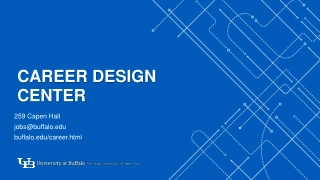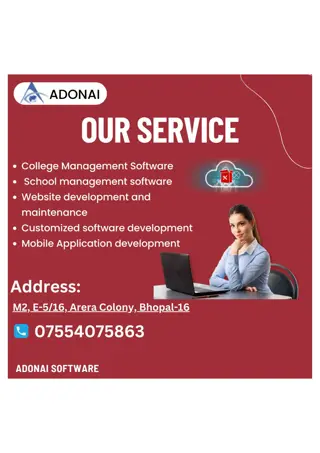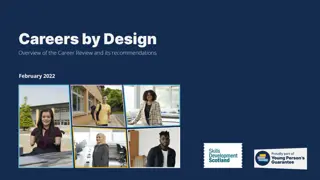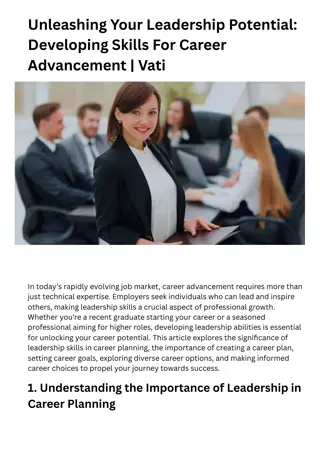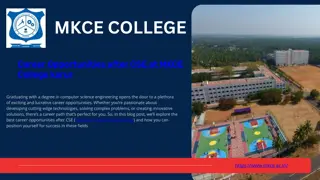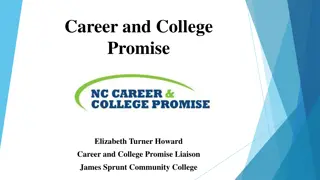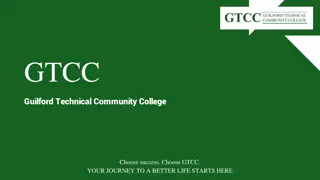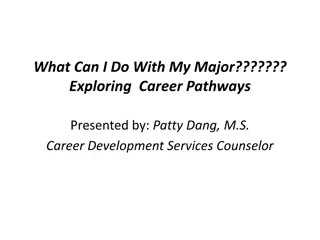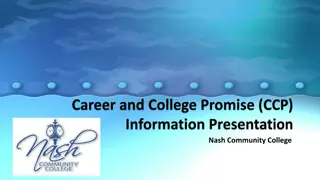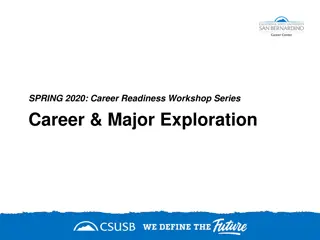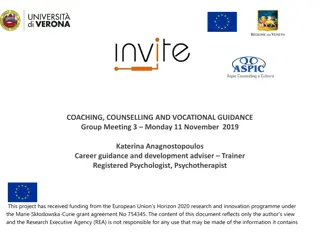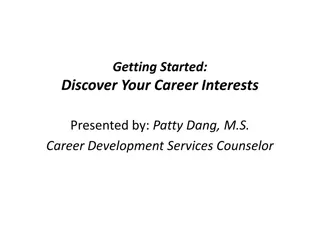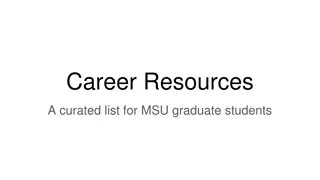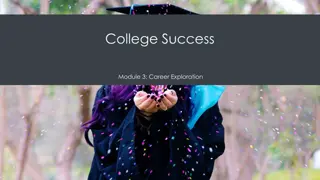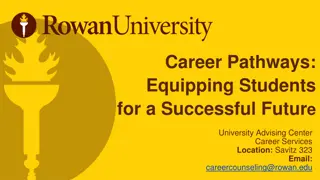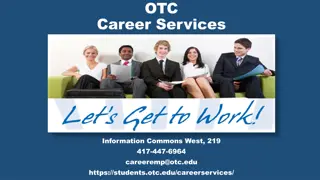
Navigate Your Job Search Successfully
Learn valuable insights about job searching, resumes, interviews, and accessibility resources to enhance your career prospects. Discover effective strategies to transition from college to a career seamlessly and maximize your job search efforts. Gain access to a wealth of resources and guidance to support your professional development journey.
Download Presentation

Please find below an Image/Link to download the presentation.
The content on the website is provided AS IS for your information and personal use only. It may not be sold, licensed, or shared on other websites without obtaining consent from the author. If you encounter any issues during the download, it is possible that the publisher has removed the file from their server.
You are allowed to download the files provided on this website for personal or commercial use, subject to the condition that they are used lawfully. All files are the property of their respective owners.
The content on the website is provided AS IS for your information and personal use only. It may not be sold, licensed, or shared on other websites without obtaining consent from the author.
E N D
Presentation Transcript
The presents: From College to Career From College to Career Workshop Richard Fajardo Counseling Intern
Todays Agenda Job Search Resumes, Cover Letters, & Curriculum Vitae (CVs) Interviews Workplace Accessibility & Reasonable Accommodation Questions Please feel free to ask questions throughout the presentation We can also address any other questions at the end of the presentation
What is a job search? When does a job search begin? A job search can be going on at any time. There is not a set timeframe for how long a job search is. Ways to get information Research (online, print, etc.) Networking 78% of recruiters rank referrals as the best source for quality hires Referred applicants are 5 times more likely than average to be hired, and 15 times more likely to be hired than applicants from a job board. *source: https://www.jobvite.com/jobvite-news-and-reports/new-year-new-job-what-job- seekers-need-to-know-in-2017/ Informational interviews Some popular resources Bureau of Labor Statistics: Occupational Outlook Handbook https://www.bls.gov/ooh/ What Can I Do with This Major? https://whatcanidowiththismajor.com/major/majors/ Indeed.com LinkedIn.com
JCU Resources Student Accessibility Services Center for Career Services Career Advisors Peer Advisors Handshake platform & job database: https://jcu.joinhandshake.com/login Your major s academic department Academic Advisors College of Arts & Sciences Office of Academic Advising and Student Affairs Academic Coaches Boler College of Business Business Professional Development Program Internship and Employer Relations programs Edward M. Muldoon Center for Entrepreneurship The Center for Leadership Skills Development The Ginn Institute for Corporate Social Responsibility John Carroll Alumni Chapters others
Other Accessibility Resources Opportunities for Ohioans with Disabilities (OOD): https://www.ood.ohio.gov/ Bureau of Vocational Rehabilitation (BVR) Bureau of Services for the Visually Impaired (BSVI) Division of Disability Determination (DDD) Employer and Innovation Services (EIS) *Ohio Resource Links: https://ood.ohio.gov/Information/Resource-Links Some local organizations Hattie Larlham: http://www.hattielarlham.org/ Vocational Guidance Services: http://www.vgsjob.org/ Creative Rehab: https://creativerehab.info/ Milestones Autism Resources: https://milestones.org/
Job Posts Job posts often include: Job Title Description/Summary Duties and Responsibilities Required Qualifications Preferred Qualifications Normal Working Hours and Conditions Physical Requirements Hours Salary Type Instructions Required Documents Supplemental Questions
Job Posts Examples JCU Project Manager: https://jcu.peopleadmin.com/postings/1635 JCU Administrative Assistant: https://jcu.peopleadmin.com/postings/1633 Teacher: https://clevelandmetroschools.wd1.myworkdayjobs.com/en- US/jobs/job/Administration-or-As-Assigned/Teacher-District-Wide- 2019-2020_R0006471 School Based Therapist: https://jcu.joinhandshake.com/jobs/1497914?ref=web-app-job- search&search_id=2e098d7b-9cb4-45a4-aef0-494a3b44b390 Nurse: https://dasstateoh.taleo.net/careersection/oh_ext/jobdetail.ftl?job =180004W0&tz=GMT-05:00 Retail Cashier: https://jobs.target.com/job/-/-/1118/11206334?src=JB-10182
Resumes & CVs Resume For most professional jobs Showcase experience, education, and other qualifications Intended not to get you the job, but to get you the interview Entry-level candidates: 1 page Types: Chronological Functional Examples: http://webmedia.jcu.edu/careercenter/files/2019/02/Resume-Sample-Guide-1.pdf Curriculum Vitae (CV) For academic professional jobs Entry-level candidates: 2-3 pages Examples: https://icc.ucdavis.edu/sites/g/files/dgvnsk2236/files/local_resources/resume- samples/undergrad_cv.pdf https://icc.ucdavis.edu/sites/g/files/dgvnsk2236/files/local_resources/resume- samples/cv-science.pdf
Resumes & Cover Letters JCU guidance: http://sites.jcu.edu/careercenter/pages/students/resumes -and-cover-letters/ Resume Writing Guide: http://webmedia.jcu.edu/careercenter/files/2019/02/R esume-Writing-Guide.pdf Cover Letter Writing Guide: http://webmedia.jcu.edu/careercenter/files/2018/11/C over-Letter-Writing-Guide-2.pdf
Interviews Screening Phone Screening Face-to-Face Screening Skype/Zoom/FaceTime Screening Behavioral Based Job Interview Sample questions: https://www.themuse.com/advice/30- behavioral-interview-questions-you-should-be-ready-to- answer STAR Method / SOAR Method Situation, Task, Action, Result https://www.vawizard.org/wiz-pdf/STAR_Method_Interviews.pdf Situation, Obstacle, Action, Result
References & Recommendations Reference List *For phone call or email correspondence *Ask them in advance Recommendation Letters *1 page letter print/digital *Ask them in advance: ideally 1-2 months in advance Who to ask to be a reference contact or provide a recommendation? Supervisor/Manager Professor/Teacher Coach Peer
Workplace Accessibility Guidance from the U.S. Equal Employment Opportunity Commission (EEOC) https://www.eeoc.gov//facts/jobapplicant.html Key term: Reasonable Accommodation Appropriate changes and adjustments Includes the interview/hiring process and working on the job
Workplace Accessibility Understanding Limitations to Accommodations: An employer does not have to hire you if you are unable to perform all of the essential functions of the job, even with reasonable accommodation. An employer does not have to provide a specific accommodation if it would cause an undue hardship (if it would require significant difficulty or expense). Accommodations: An employer cannot refuse to consider you because you require a reasonable accommodation to compete for or perform a job. An employer cannot reject you only because the disability prevents you from performing minor duties that are not essential to the job.
Workplace Accessibility Some questions are illegal during the interview process Examples of prohibited questions during the pre-offer period include: Do you have a heart condition? Do you have asthma or any other difficulties breathing? Do you have a disability which would interfere with your ability to perform the job? How many days were you sick last year? Have you ever filed for workers' compensation? Have you ever been injured on the job? Have you ever been treated for mental health problems? What prescription drugs are you currently taking? An employer can ask these questions after extending a job offer if they ask these questions of all employees
Disclosure The ADA does not require that an applicant inform an employer about the need for a reasonable accommodation at any particular time, so this information need not be volunteered on an application form or in an interview. The ADA contains strict confidentiality requirements, so employers must keep this information confidential with certain exceptions. An employer cannot ask questions about an applicant's disability either because it is visible or because the applicant has voluntarily disclosed a hidden disability. An employer cannot ask all applicants whether they would need reasonable accommodation to perform a job because the answer to this question is likely to reveal whether an applicant has a disability. However, if the employer knows that an applicant has a disability, and it is reasonable to question whether the disability might pose difficulties for the individual in performing a specific job task, then the employer may ask whether she would need reasonable accommodation to perform that task. An employer might know that an applicant has a disability because it is obvious or she has voluntarily revealed the existence of one. If the applicant indicates that accommodation will be necessary, then the employer may ask what accommodation is needed.
Disclosure An employer may share medical information with other decision-makers involved in the hiring process who need it so they can make employment decisions consistent with the ADA. The ADA also permits an employer to share medical information with the following individuals: supervisors and managers may be told about necessary restrictions on the work or duties of an employee and about reasonable accommodations first aid and safety personnel may be told if the disability might require emergency treatment government officials investigating compliance with the ADA state workers' compensation offices, state second injury funds, or workers' compensation insurance carriers. An employer also may use the information for insurance purposes.
EEOC Assistance If you think an employer has denied you a job or an equal opportunity to apply for a job based on your disability, refused your request for reasonable accommodation, or has asked you illegal medical inquiries or required you to take an illegal medical examination, you should contact the EEOC. A charge (complaint) of discrimination generally must be filed within 180 days of the alleged discrimination. You may have up to 300 days to file a charge if a state or local law provides relief for discrimination on the basis of disability. However, to protect your rights, it is best to contact the EEOC promptly if you suspect discrimination has occurred.
Workplace Accessibility Other accessibility & disclosure guidance: Edinboro University: https://tartanedge.edinboro.edu/channels/candidates- with-accessibility-needs/ University of Washington: https://www.washington.edu/doit/videos/index.php?vid =17 CareerOneStop (U.S. Department of Labor): https://www.careeronestop.org/ResourcesFor/Workers WithDisabilities/disclosing-a-disability.aspx
Any questions? Any questions? Richard Fajardo Counseling Intern rfajardo19@jcu.edu SAS@jcu.edu
Thank you! Thank you! Richard Fajardo Counseling Intern rfajardo19@jcu.edu SAS@jcu.edu


